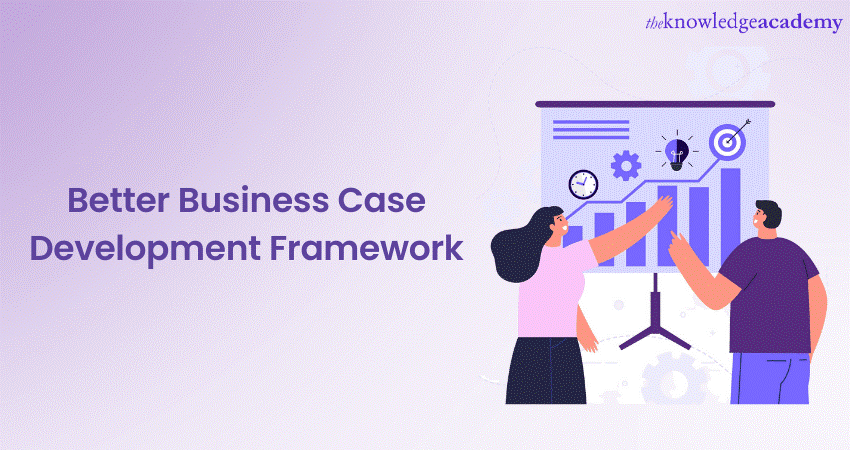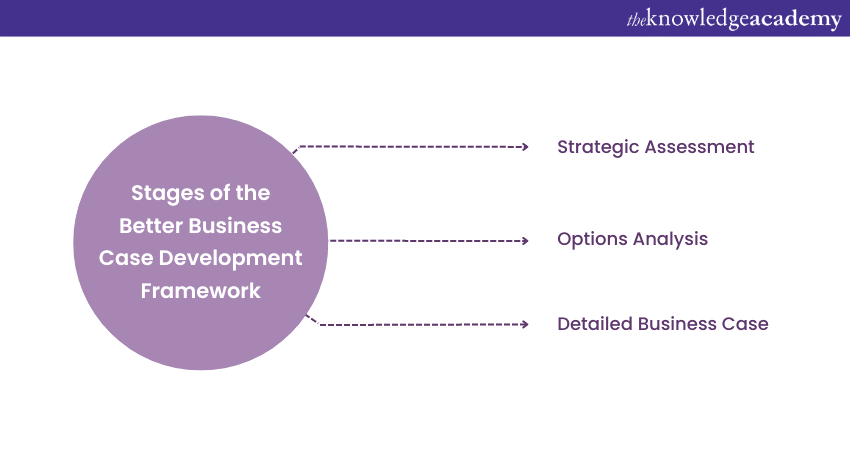We may not have the course you’re looking for. If you enquire or give us a call on + 1-866 272 8822 and speak to our training experts, we may still be able to help with your training requirements.
Training Outcomes Within Your Budget!
We ensure quality, budget-alignment, and timely delivery by our expert instructors.

Digital transformation around the world has changed our traditional perception of working processes in the workplace. With digital technologies surfacing every year, every organisation must evolve and adapt to the latest technological trends and global standards. Organisations try to achieve this by adopting prevalent frameworks – and one of the many prevalent frameworks used by organisations is the Better Business Case (BBC) guidance. The BBC guidance is made of several components, out of which one is the Better Business Case Development Framework.
According to a 2018 UK Treasury report, over 3,000 people had completed BBC training, and more than 500 business cases had been assessed using the approach. This shows the rising prevalence of Better Business Cases in the United Kingdom. This blog will elaborate on the Better Business Case Development Framework, its different stages, the guidance it provides, and the principles it promotes.
Table of Contents
1) What is the Better Business Case Development Framework?
2) What are the stages in the Better Business Case Development Framework?
a) Strategic Assessment
b) Options Analysis
c) Detailed Business Case
3) What guidance does the Better Business Case Development Framework provide?
4) What principles does the Better Business Case Development Framework promote?
5) Conclusion
What is the Better Business Case Development Framework?
The Better Business Case (BBC) guidance was designed to help organisations make better-informed investment decisions by providing a detailed framework for assessing and comparing different options. It was developed by the UK Treasury in 2008 and is now used all over the public sector.
Before we delve deeper into what a Better Business Case Development Framework is, we will first define a business case development framework. Any project requiring a significant investment must be supported by a strong business case to justify the pursuit's affordability. This toolkit establishes the objectives, components, and processes involved with business case development.
The core objectives of a business case development framework are to quantify improvement opportunities, ensure resources are allocated to appropriate areas, establish benefits to be achieved, and develop the rationale to justify the necessary changes. All these objectives are fulfilled by the Better Business Case Development Framework, an integral component of the BBC guidance that helps an organisation in every step of the business case investment proposal process.
Want to strengthen your Better Business Cases foundation? Join our Better Business Cases Foundation course!
What are the stages in the Better Business Case Development Framework?

The Better Business Case Development Framework guides business case investment proposal through a series of three stages, which are namely:
Strategic Assessment
The first stage in the Better Business Case Development Framework is the Strategic Assessment stage. This stage aims to identify the potential ideas that could resolve the issues or develop the opportunity. It has to be evaluated whether any of the ideas have the potential to be feasible options.
The aforementioned evaluation helps shape the service need and the base case. One of the critical elements in this stage is to hold workshops to generate ideas followed by an assessment of the ideas against a collection of relevant criteria. This is to determine if any of the ideas could achieve feasible outcomes to either resolve the problem or develop an opportunity.
The outcome of the Strategic Assessment stage is to identify the service need and determine the potential “long list” of options.
Options Analysis
The second stage in the Better Business Case Development Framework is the Options Analysis stage. The purpose of the Options Analysis stage is to narrow the options down to a few by applying detailed evaluation criteria before determining the feasibility of any remaining options. The Options Analysis builds on the work done in the Strategic Assessment in the Better Business Case Development Framework.
The evaluation will involve developing suitable criteria and applying appropriate techniques to narrow the options down. The remaining options are then subjected to a rigorous, detailed assessment of the potential viability. This is done using socio-economic, financial, environmental and sustainability analysis, and the options are then ranked accordingly.
The outcome of the Options Analysis is to update the previously identified service need and the preferred options supported by a robust and holistic analysis.
Detailed Business Case
The third stage in the Better Business Case Development Framework is the Detailed Business Case. The purpose of the Detailed Business Case is to evaluate the feasibility of the highest-ranked option with the surety of outcomes judged and to develop the appropriate investment implementation plans. Like the previous stage, the Detailed Business stage builds on the progress made by the Options Analysis stage.
The evaluation in the Detailed Business Case stage will involve an all-encompassing assessment across all relevant criteria. The review will use in-depth evaluation tools to develop conclusive evidence of investment feasibility (whenever appropriate) and certainty of the expected outcomes.
The outcome of the Detailed Business case is one where a business case is produced – one that provides clear, comprehensive evidence for a potential decision amongst decision-makers.
What guidance does the Better Business Case Development Framework provide?
The Business Case Development Framework provides fit-for-purpose guidance that is in recognition of the different needs, considerations and assumptions for analysis – across infrastructure investment proposals. The supplementary guidance is provided and outlined in the following guides, which we will explore in detail as follows:
1) The Cost Benefit Analysis (CBA) Guide: The Cost Benefit Analysis Guide offers a systematic approach to informing an investment decision with the help of a robust and transparent analysis of costs and benefits that also assesses economic viability.
2) The Benefits Management (BM) Guide: The Benefits Management (BM) Guide offers a directed end-to-end process that identifies, defines, measures, evaluates and reports benefits. The Benefits Management Guide aims to help determine whether a proposed initiative has achieved its expected outcomes and objectives once it has been delivered.
3) The Investment Logic Mapping (ILM) Guide: The Investment Logic Mapping (ILM) Guide offers a step-by-step approach to the identification and mapping of service needs and benefits sought. It also provides a path to developing potential initiatives that address the service need.
4) The Stakeholder Engagement (SE) Guide: The Stakeholder Engagement (SE) Guide offers a detailed lifecycle approach to engaging stakeholders. It helps support the development and implementation of communication and other engagement opportunities.
5) The Social Impact Evaluation (SIE) Guide: The Social Impact Evaluation (SIE) Guide offers clarity on the relationship between social impacts, risks and benefits – including additional elements of the business case.
What are the principles that the Better Business Case Development Framework promotes?
The Better Business Case Development Framework promotes several principles. These principles ask several questions to a set of considerations and are listed as follows:
|
Considerations |
Questions |
|
Investment |
1) Have non-built solutions been considered? 2) What evidence will the analysis add that would strengthen the case for investment? |
|
Decision |
Does the infrastructure proposal consist of all the necessary relevant analysis to inform the decision-maker? |
|
Credibility |
1) Has the relevant analysis been determined by contemporary and reliable information? 2) Are the relevant considerations and assumptions appropriately articulated? |
|
Transparent |
Has the information been articulated without bias and given enough consideration to managing risks and benefits? |
|
Comparability |
How does the assessment support compare to the other infrastructure proposals? |
|
Accountability |
Does the chosen infrastructure proposal identify a single point of ownership for: 1) Sponsorship? 2) Planning and Development? 3) Engagement of Stakeholders? Risk and Benefits Management? |
Join our Better Business Cases Foundation & Practitioner course to gain a clear understanding of how business cases work.
Conclusion
Overall, the Better Business Case Development Framework is integral to any business case development process. It guides business case investment proposal through three stages: the Strategic Assessment, the Options Analysis and the Detailed Business Case.
By following the guidelines and principles established in the framework, organisations can ensure that their business cases are based on solid, concrete and transparent evidence and provide a comprehensive rationale for the proposed investment. This helps an organisation increase the likelihood of the investment returning the expected benefits and helps reduce the risk of expensive and unnecessary investment decisions.
Learn how to develop a comprehensive business case by signing up for our Better Business Cases courses.
Frequently Asked Questions
Upcoming Project Management Resources Batches & Dates
Date
 Better Business Cases™ Foundation & Practitioner
Better Business Cases™ Foundation & Practitioner
Thu 1st Jan 1970







 Top Rated Course
Top Rated Course



 If you wish to make any changes to your course, please
If you wish to make any changes to your course, please


